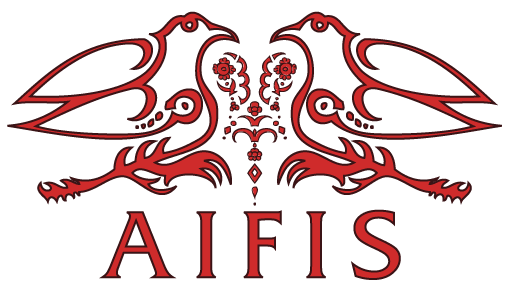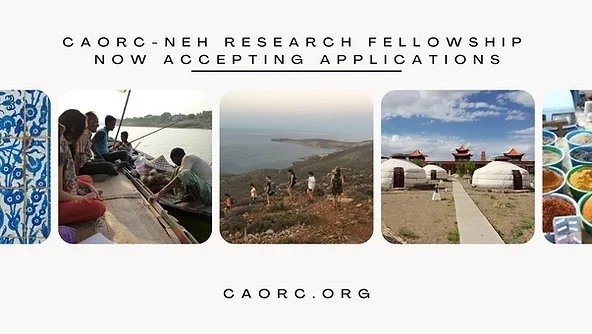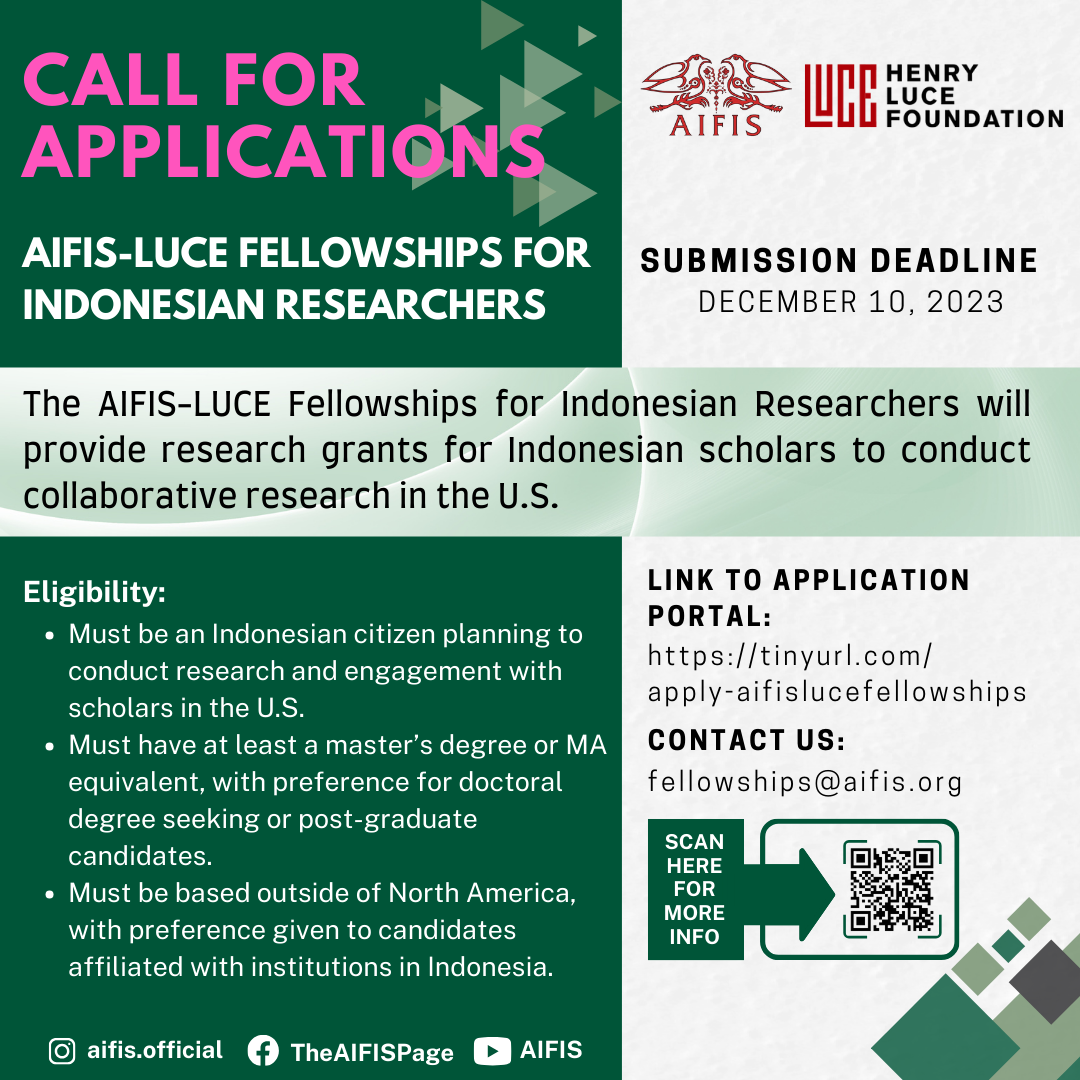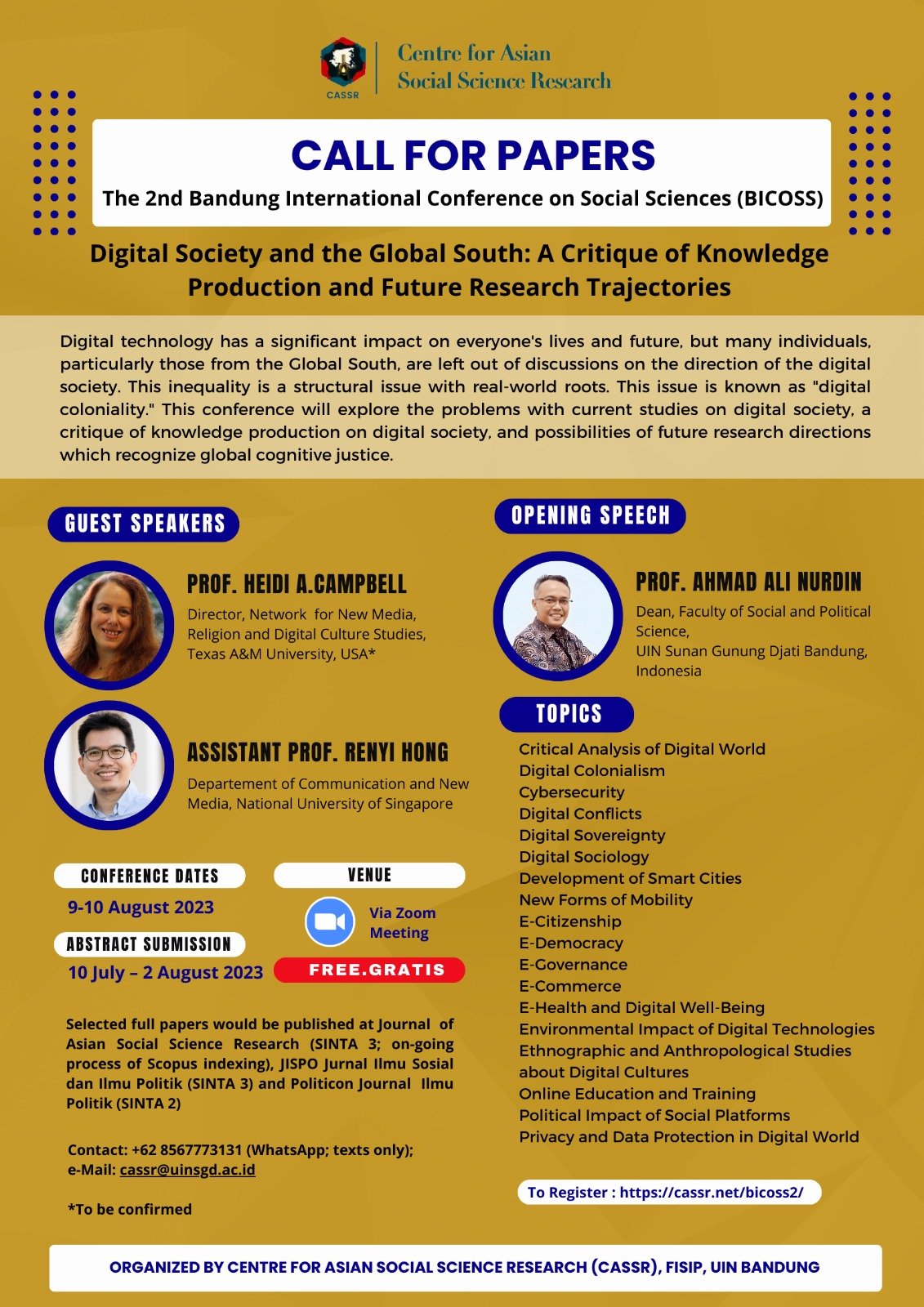AIFIS invites applications from artists, performers, and other creative scholars who are actively working to bring Indonesian arts and culture to American audiences for a new fellowship program for public arts. The AIFIS-Luce Small Grants Program will provide competitive grants for public-facing events designed to broaden popular understandings of Indonesia among U.S. audiences. Grants awarded will range from US$500 to US$2500 per proposal and be reviewed on a quarterly basis by a special committee of AIFIS Board Members. This fellowship program is made possible with the generous support from the Henry Luce Foundation, and will support a total of $20,000 worth of small grants for public events over the course of 2023-2024.
Call for Applications: CAORC-NEH Research Fellowships
This fellowship provides the opportunity for scholars to spend significant time in one country with an Overseas Research Center as a base. The fellowship supports advanced research in the humanities for scholars who hold a PhD or a terminal degree. Applicants must be US citizens or foreign national scholars who have been resident in the US for at least three years. Approximately four awards will be granted and fellowship stipends are $5,000 per month for four to six consecutive months.
Fields of study include, but are not limited to, history, philosophy, religious studies, linguistics, languages, literature, literary criticism, and visual and performing arts. In addition, research that embraces a humanistic approach and methods will be considered.
Minority scholars and scholars from Minority-Serving Institutions are encouraged to apply.
Deadline: January 24, 2024
AIFIS-Luce Research Fellowships for Indonesian Scholars to the US
AIFIS invites applications from graduate students, researchers, academics, and/or faculty members based in Indonesia to conduct research in the U.S. Through competitive application, 10 scholars will be selected to each receive a grant of $7000 for research and travel to the U.S. These grants are designed to foster engagement between Indonesian and American scholars and to raise existing collaborations to new levels by stimulating small cooperative projects in any field of Indonesian studies, or social sciences, humanities and STEM fields for which the Indonesian context is central to the research. This fellowship program is made possible with the generous support of the Henry Luce Foundation.
Call for Papers: 2nd Bandung International Conference on Social Science, 9-10 August 2023
Organized by the Centre for Asian Social Science Research, FISIP, Universitas Islam Negeri Bandung, the 2nd Bandung International on Social Science (BICOSS) will take place virtually on 9-10 August 2023. This year’s theme focuses on the subject of “Digital Society and the Global South: A Critique of Knowledge Production and Future Research Trajectories.”
Digital technology has a significant impact on everyone’s lives and future, but many individuals, particularly those from the Global South, are left out of discussions on the direction of the digital society. This inequality is a structural issue with real-world roots. This issue is known as “digital coloniality.” This conference will explore the problems with current studies on digital society, a critique of knowledge production on digital society, and possibilities of future research directions which recognize global cognitive justice.
Guest speakers will include Prof. Heidi A. Campbell (Director, Network for New Media, Religion and Digital Culture Studies, Texas A&M University, USA) (To be Confirmed), Assistant Prof. Renyi Hong (Department of Communication and New Media, National University of Singapore), and an Opening speech by Prof. Ahmad Ali Nurdin (Dean, Faculty of Social and Political Science, Universitas Islam Negeri Sunan Gunung Djati Bandung, Indonesia).
The organizers welcome abstract submissions in the following research areas:
Critical Analysis of Digital World
Digital Colonialism
Cybersecurity
Digital Conflicts
Digital Sovereignty
Digital Sociology
Development of Smart Cities
New Forms of Mobility
E-Citizenship
E-Democracy
E-Governance
E-Commerce
E-Health and Digital Well-Being
Environmental Impact of Digital Technologies
Ethnographic and Anthropological Studies about Digital Cultures
Online Education and Training
Political Impact of Social Platforms
Privacy and Data Protection in Digital World
Abstract Submission Deadline: 2 August 2023*
Conference Date: 9-10 August 2023
Venue: Online via Zoom
Cost: Free. Gratis.
Contact: 0815-7281-7107 (WhatsApp; texts only); email: cassr@uinsgd.ac.id
*Note that selected full papers will be published in the Journal of Asian Social Science Research (SINTA 3; on-going process of Scopus indexing), JISPO Jurnal Ilmu Sosial dan Ilmu Politik (SINTA 3) and Politicon Jurnal Ilmu Politik (SINTA 2)
To register, click here.
AIFIS President Bob Hefner Announces Release of Indonesian Pluralities Films
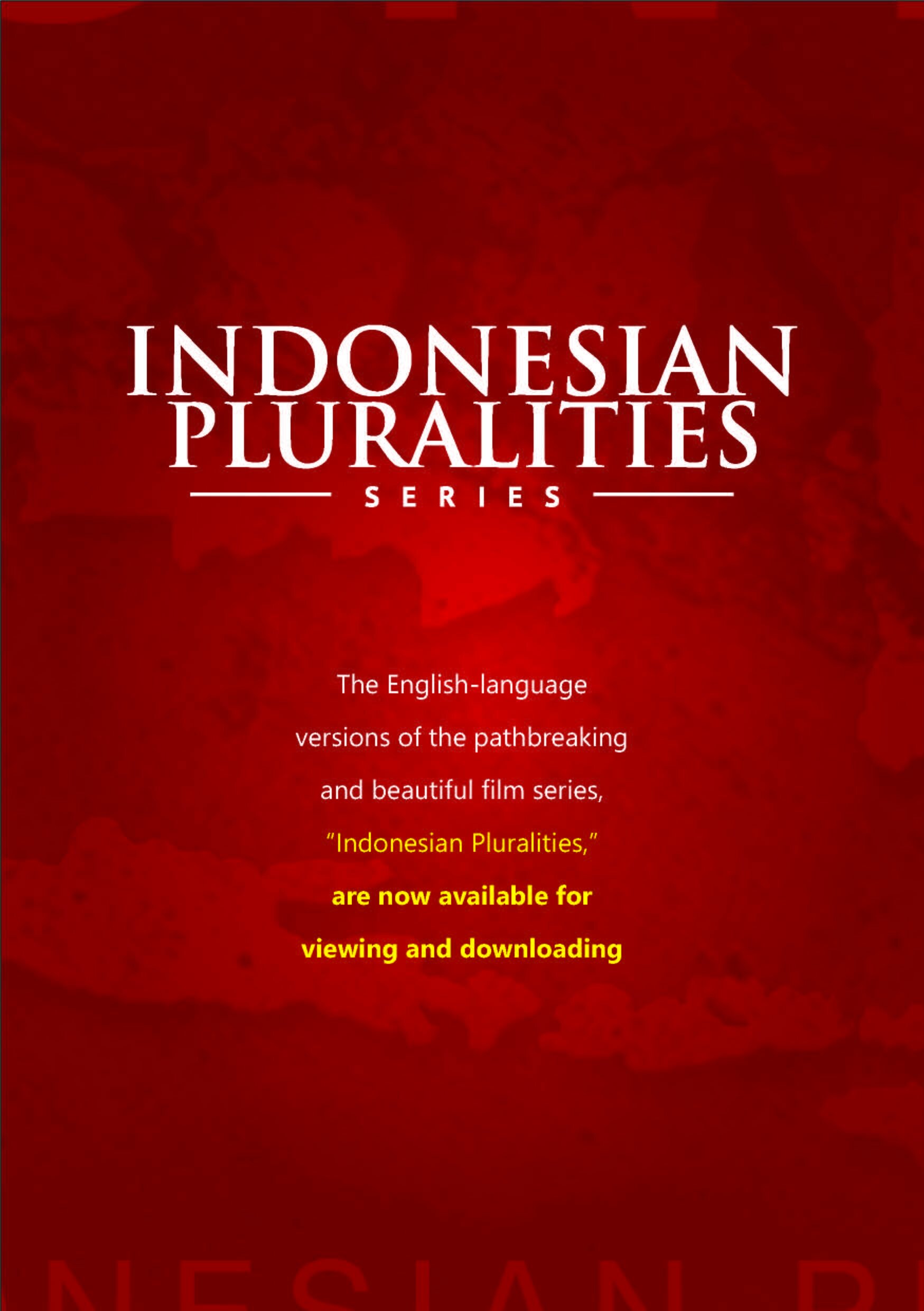
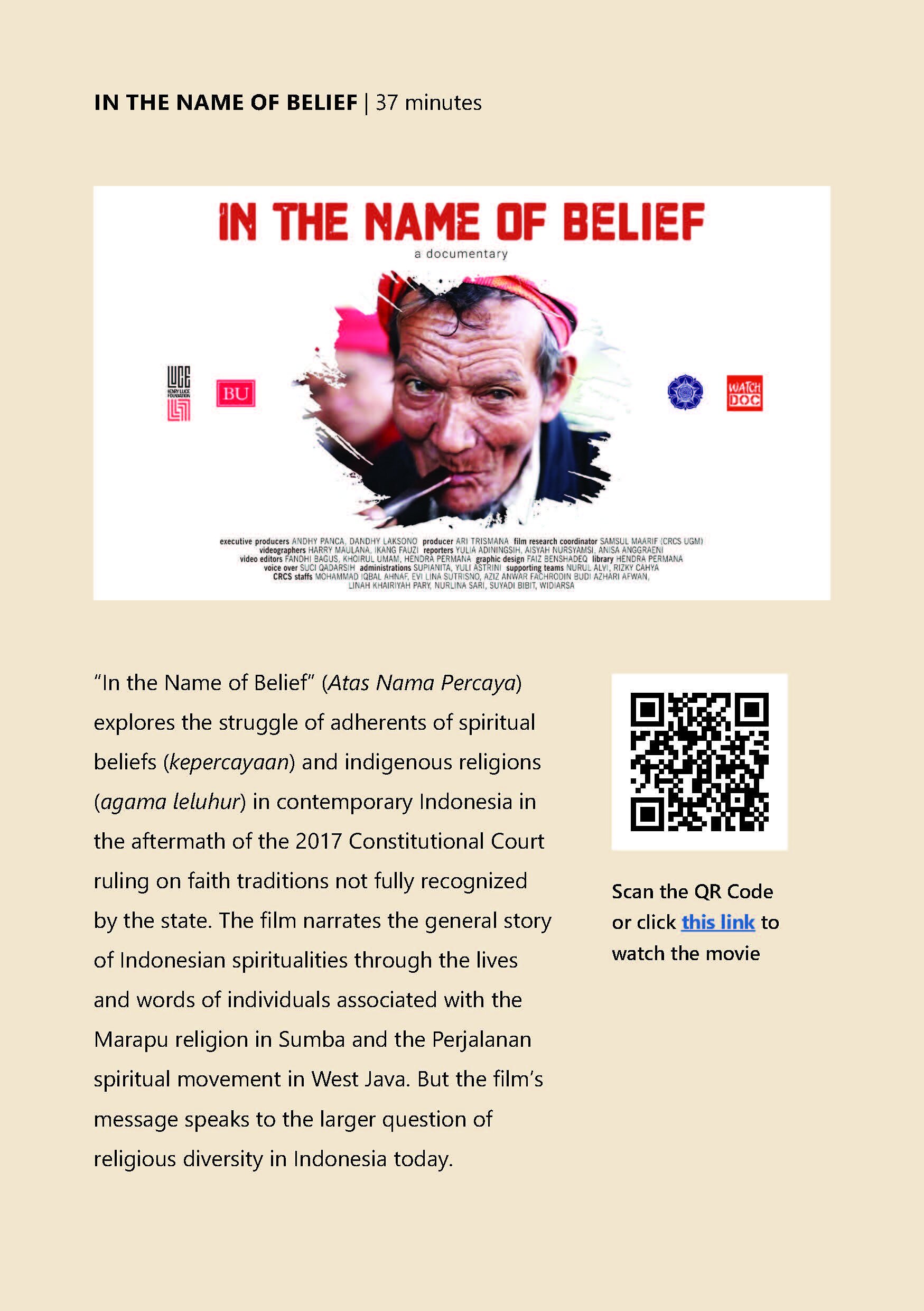
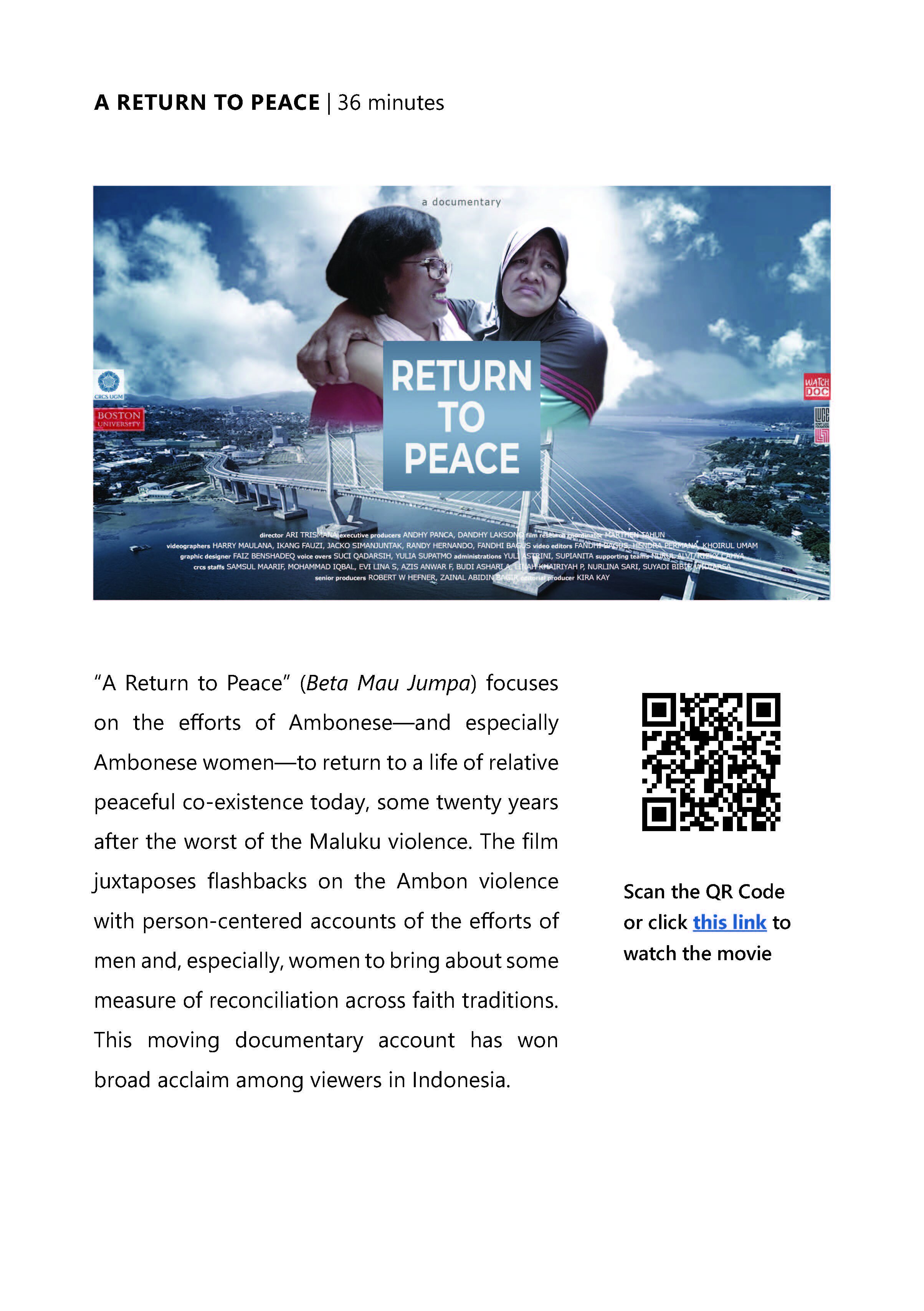
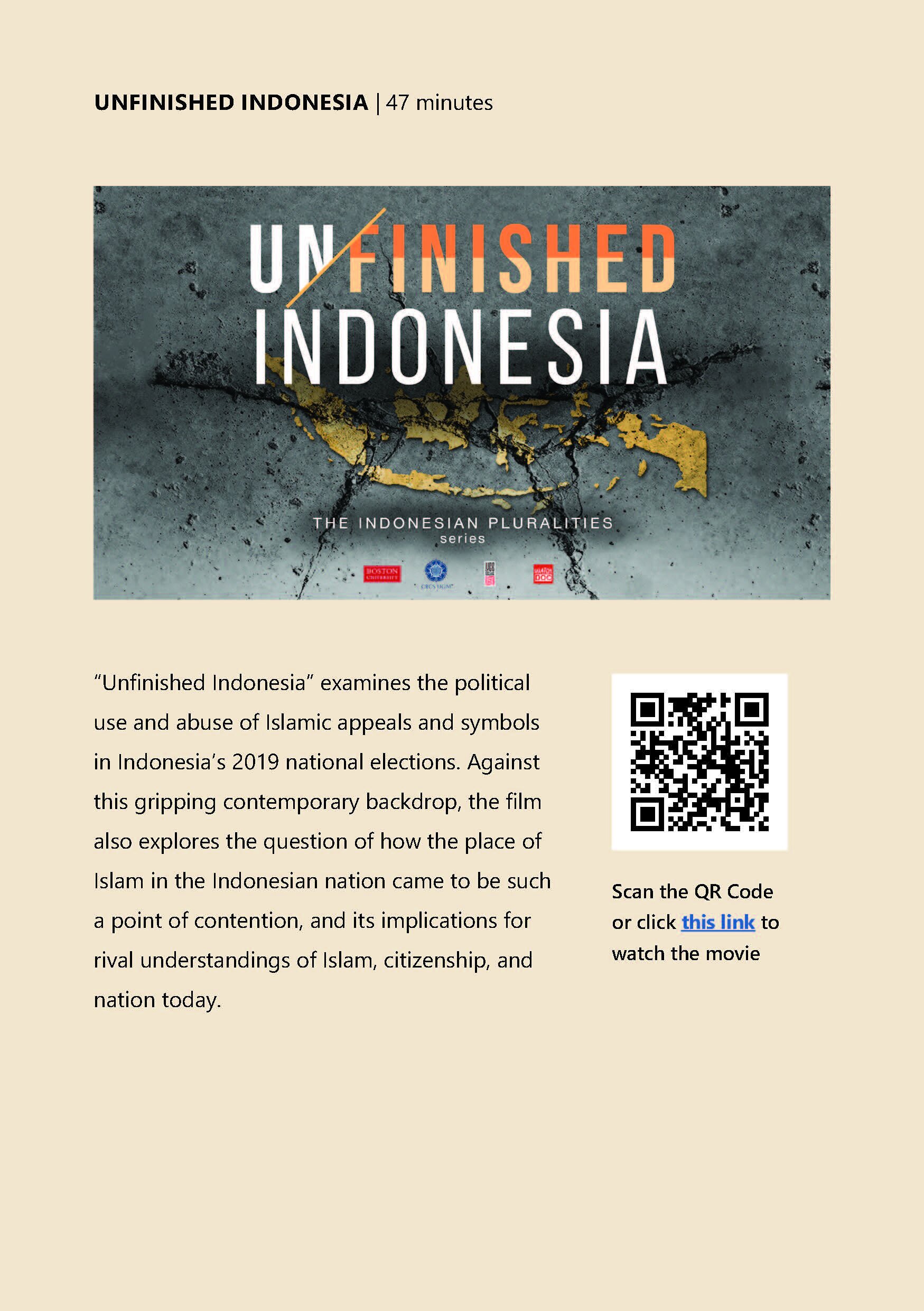
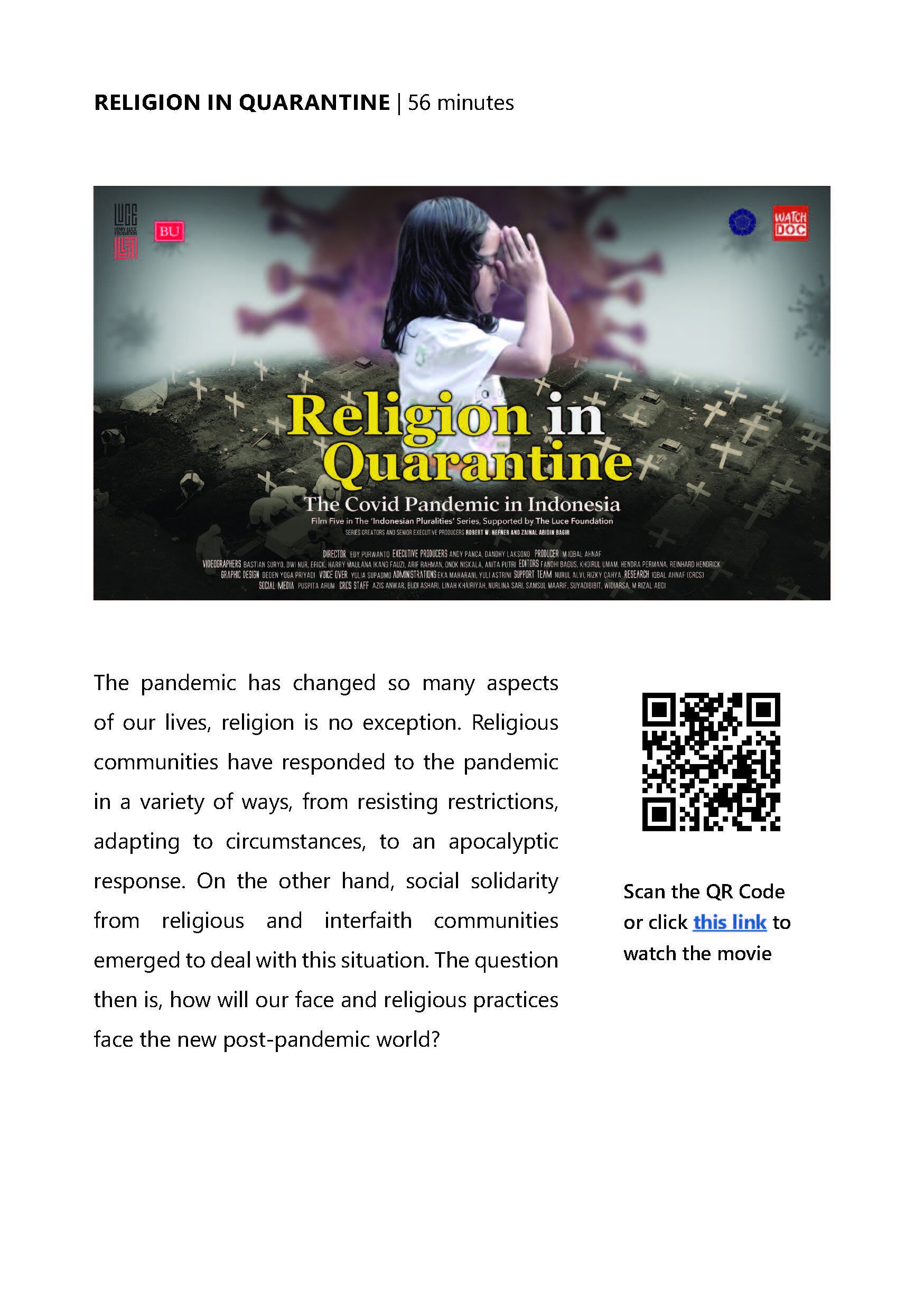
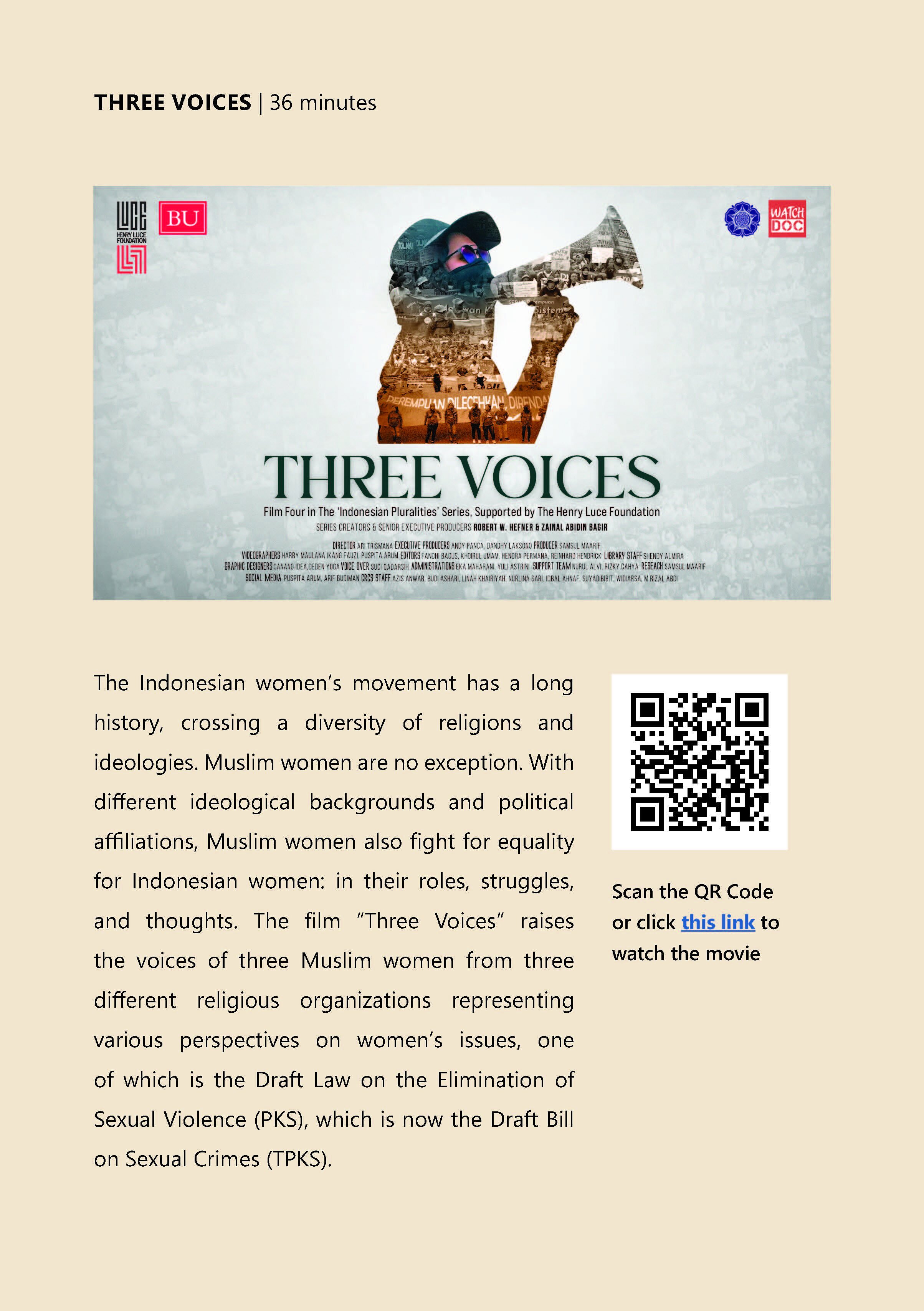
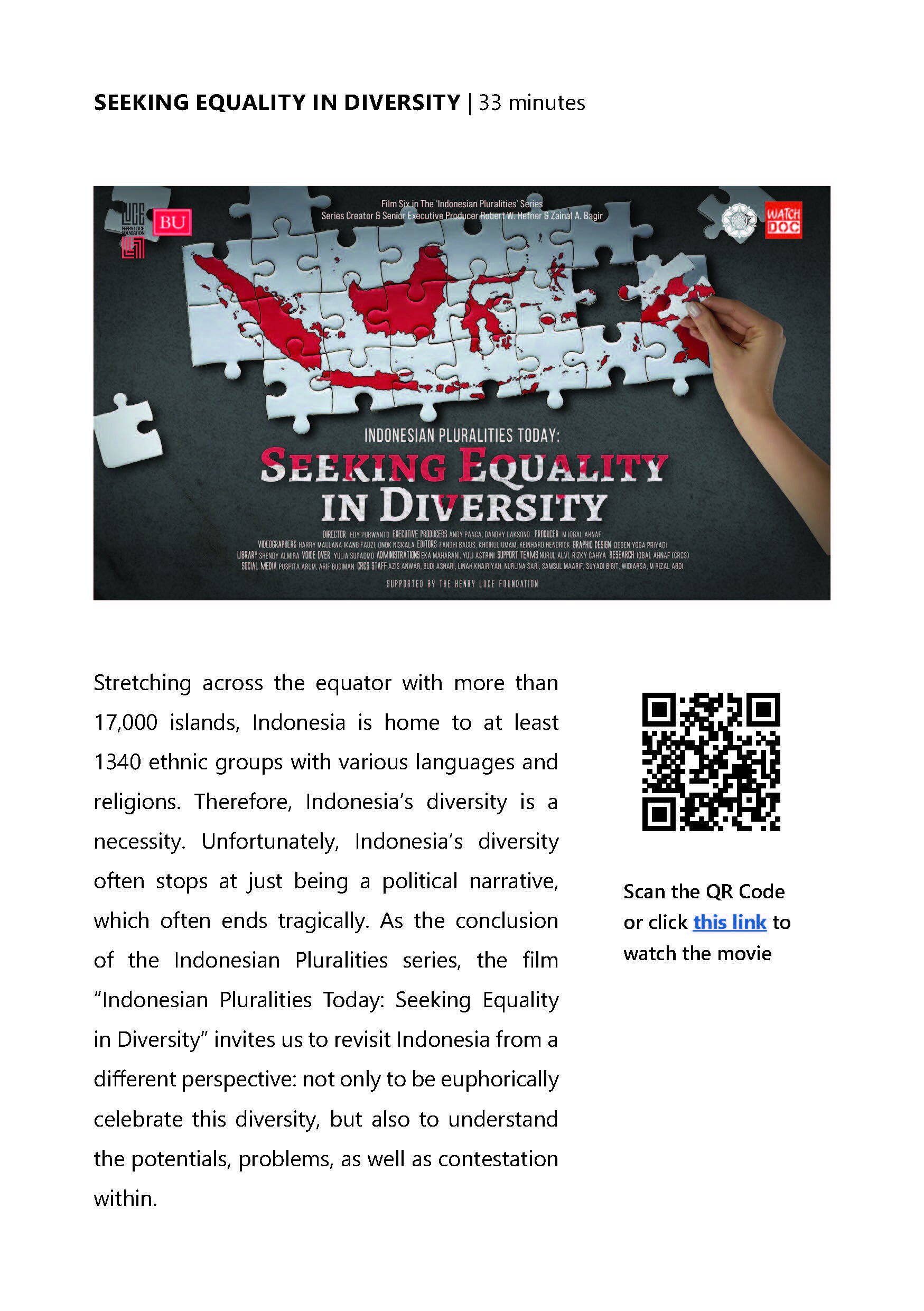
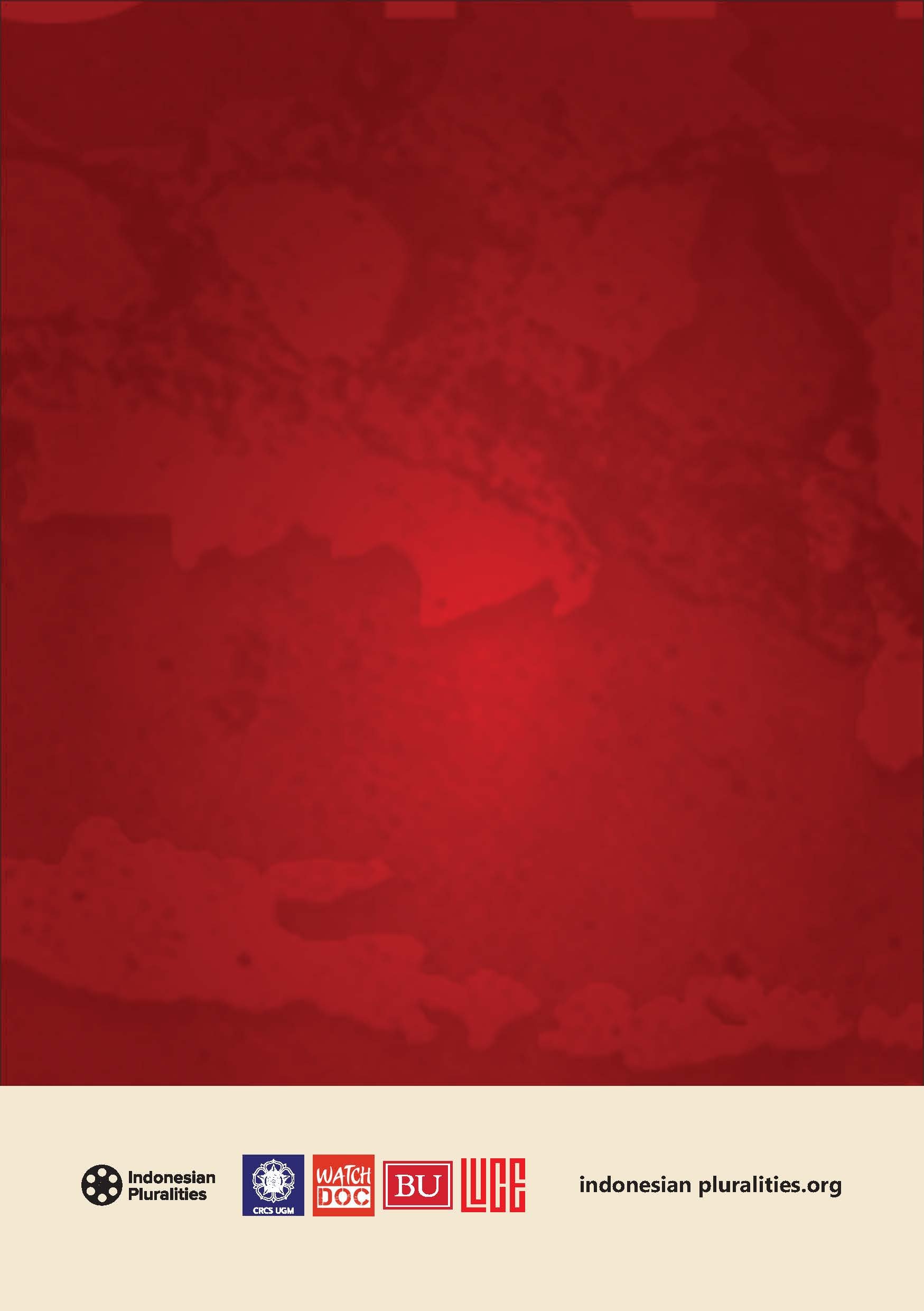
A note from AIFIS President Bob Hefner:
As the month of May comes to a close, my three year project as executive co-producer (with Zainal Abidin Bagir of UGM) on seven documentary films on Indonesia is also coming to a close (May 30). The films, co-created with Watchdoc Documentary (https://watchdoc.co.id/), are available both in Indonesian and in English and they are entirely free of charge. They are also available both on Youtube or, for those wanting digital copies for their libraries, they can also be downloaded online (through Zainal or me).
As the above flyers make clear, the films deal with a range of topics:
In the Name of Belief explores the struggle of adherent of “spirituality groupings” (kepercayaan) to achieve recognition in the face of government policies that do not recognize these mystical groups as full “religions” (agama);
Ambon: A Return To Peace examines the role of women and women’s groups in effecting reconciliation across religious divides in the aftermath of Ambon’s bitter Christian-Muslim conflict;
Unfinished Indonesia examines the use and abuse of Islamic appeals in Indonesia’s 2019 elections, focusing in particular on the sectarian mobilization against Jakarta’s Christian-Chinese governor
Religion in Quarantine examines the role played by religious organizations in responding to the covid pandemic in Indonesia
Three Voices examines the experiences and lives of three Indonesian Muslim women: one a feminist, a second a reformist moderate, the third a moderate Islamist associated with the Prosperous Justice Paraty;
Indonesian Pluralities today: Seeking Equality in Diversity, examines the challenge of achieving citizen equality for all ethnic and religious groups in contemporary Indonesia.
In early June, our teams will release an English-language version of the seventh and last film on the series, on Chinese Indonesians and Citizen inequality, as seen from the experience of the Chinese community in Yogyakarta, Indonesia.
Although Zainal and I are just now bringing the films to American universities and the American public, Indonesian versions of the films have been watched at some 300 film events in Indonesia over the past 20 months. We’ve been enormously pleased by their reception. Given Zainal and my pro-pluralist positioning, the films have caused a little controversy; interestingly, however, even the Ministry of Religion and the Ministry of Education have applauded the films. Rather more surprisingly, at the peak of the covid shutdown of Indonesian schools, the national union of teachers and the Ministry of Education actually used three of the Indonesian-language versions of the courses in “belajar di rumah” (“learn at home”) programs run for high school students online, for students otherwise unable to attend school. The films have also been shown at a number of universities and conferences here in the U.S., although we are just now scaling up distribution here in North America. The flyers not only describe the films – they also have embedded hyperlinks that allow viewers to go directly to youtube to watch each film. Finished copies of the films are also available for download by request for individuals or libraries that wish to obtain these free films.
Finally, our film partners in Indonesia (Watchdoc documentaries) have indicated that the English language version of film seven will be available by the end of June. We are excited to offer a screening and discussion of the final Indonesian Pluralities film, Equal Citizens? Chinese Indonesians in Yogyakarta, at the AIFIS-MSU Conference on Indonesian Studies, July 11-15, 2023.
Thanks again, and salam dari Boston,
Bob Hefner
Professor of Anthropology and Global Affairs
Pardee School of Global Affairs
Director, Center for the Study of Asia
President, American Institute for Indonesian Studies
Past President, Association for Asian Studies
Honoring the Life of John MacDougall
John MacDougall, a pioneer of using the Internet as a research tool for Indonesian studies, died in Maryland on May 16. Among his many services, he was editor and publisher of Indonesia Publications from 1984 to 2004; creator and moderator of a bilingual Indonesian and English “Apakabar Project” from 1990 to 2002 which attracted 250,000 readers from 96 countries, now a searchable database housed at Ohio University (http://www.indopubs.com/db.html) ; and creator of a research and learning site on Indonesia, Southeast Asia and the Islamic World, available at http://www.indopubs.com.
A native of New Jersey, he was a brilliant student. In graduate school at Harvard, he focused on social psychology and taught courses on American race and labor relations, just as the civil rights and anti- Vietnam War movements were reaching a crescendo. These movements left John with a belief that civil society advocacy was a path to political and social reform, a belief that stayed with him until the end. He taught at MIT, the National University of Singapore, Cornell, and other universities before joining the U.S. government as a Southeast Asia specialist from 1977 to 1984. It was in 1984 that he decided to strike out on his own as a chronicler of Indonesia and became an invaluable friend and resource to generations of Indonesian and American researchers.
John used the online bulletin “Inside Indonesia” to publish many of his lists of useful websites by theme: “Justice on the Net”, “Labour on the Net”, “Aceh on the Net”, “Sulawesi on the Net” and so on. Most of these appeared in 2004, 2005, and 2006.
Most of John’s thousands of online friends never met him. He worked quietly out of his home, shunning self-publicity, accolades, or any public expressions of gratitude from the many Indonesians and non- Indonesians he helped over the years. He did more for Indonesian studies over the years than many much better-known figures. He was an early fan of Facebook but became one of those quickly disillusioned by issues of invasion of privacy for profit. The explosion of social media and search sites meant that much of John’s pioneering work faded into obscurity. For anyone researching the end of the New Order, however, John’s archives remain invaluable. And as a champion of justice and human rights, he will always be a model of how to use information for anti-authoritarian ends.
Obituary prepared by Sidney Jones (Institute for Policy Analysis of Conflict)
On behalf of AIFIS we share our deepest condolences to John’s family at this time. The following are some additional comments from our board members about about John’s impact:
“John Macdougall was a tireless archivist who made available a daily mass of briefings and news reports from around the world on Indonesia from the 1990s to 2004. I used his free service every day, and could not have written most that I did in the 1990s without John’s selfless work. He was an institution in his own right, and one without peer. His passing is a reminder to us of how Indonesian studies ‘at the grassroots’ worked in pre-internet days.”
- Bob Hefner (Boston University)
“I have so much gratitude for his contribution to Indonesian Studies. I archived printed copies of his reports—they were a lifeline during my first decade in Montana, and in the tradition of Ben Anderson’s reports on the military in issues of Indonesia.”
- G.G. Weix (University of Montana)
